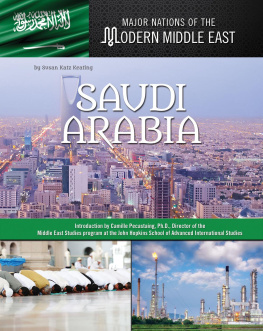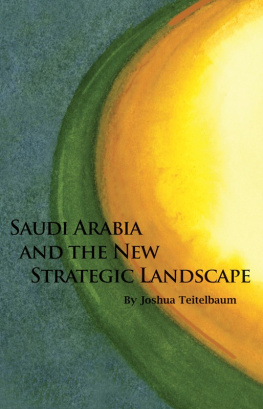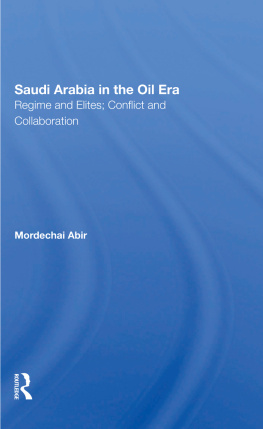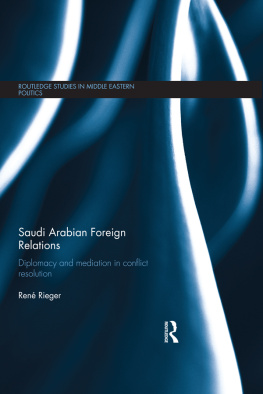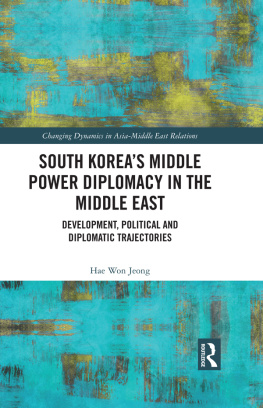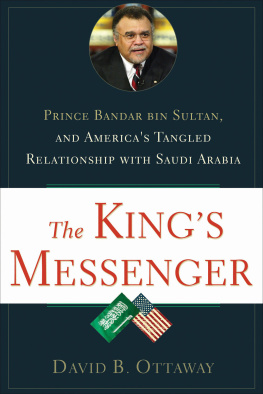
Saudi Arabia and Iraq
as Friends and Enemies
Too often, contemporary Arab history is recounted as the tale of single states struggling against misshapen and artificial borders. This book uses a wealth of primary sources to build a novel dual biography of Iraq and Saudi Arabia as co-evolving siblings. It shows how borders were not just sites of competition but also cooperation at the state and societal levels. It will surely change how we think about borders and state formation in the Middle East.
Ariel I. Ahram, author of War and Conflict in the Middle East and North Africa and Break all the Borders: Separatism and the Reshaping of the Middle East
This is an important missing link in the history of the Gulf region. Using British, Iraqi and Saudi original source materials, it explains how a complex Najdi identity political, social, economic and religious clashed with British imperial, Hashemite, and Iraqi elite interests. It answers the question of why Saudi Arabia has been a relatively stable state and Iraq a fractured one. The most stunning achievement is the integration of the sources and complex set of events into a coherent, readable narrative that illuminates the period.
Roby Barrett, author of The Greater Middle East and the Cold War: U.S. Foreign Policy under Eisenhower and Kennedy, and The Gulf and the Struggle for Hegemony: Arabs, Iranians, and the West in Conflict
This ground-breaking research is more than just a study of Saudi-Iraqi relations, as important as that is for the understanding of current affairs. This research demonstrates that todays multiple disputes and conflicts in the Middle East trace their roots to how states influenced each others trajectory, in their bilateral relations as well as their regional and domestic policies. It is a must-read both for those with a keen interest in the Middle East and those grappling to understand the regions confusing politics.
James M. Dorsey, author of Comparative Political Transitions between Southeast Asia and the Middle East and North Africa, and The Turbulent World of Middle East Soccer
This book clear and easy to read breaks new ground. For forty years, the frontier between Iraq and Saudi Arabia was one of the major concerns of the leaders of both governments, and here we now have an account of the friction and diplomacy between the two, which throws light on the personalities involved and how they worked to resolve the issue. Its a world away from modern Arabia, but here one enters the mindset of the people who created that world in the last century.
Michael Field, author of The Merchants: The Big Business Families of Saudi Arabia and the Gulf States, and the Arabian Ruling Family Trees and Government Charts
This book fills critical gaps. It provides invaluable insights into how the governments of Iraq, Saudi Arabia and Great Britain, and the peoples who lived in the border regions, negotiated the post-WWI/post-Ottoman political order and made critical choices that continue to shape both nations to this day. It discusses how the borders impacted the daily lives and politics of people living in communities situated hundreds of miles from the frontier. Equally importantly, it shows how the question of the border and the border populations shaped both nations political development in ways that have long been overlooked.
Sean Foley, author of Changing Saudi Arabia: Art, Culture & Society in the Kingdom, and The Arab Gulf States: Beyond Oil and Islam
The scholarship is superlative. The author has canvassed original documents and relied on Saudi and Iraqi memoirs to provide the reader with a reliable narrative. Thorough, and based on original documents, this genuine contribution to scholarship will become the standard-bearer for all research efforts that delve on ties between the two societies.
Joseph A. Kchichian, author of Legal and Political Reforms in Saudi Arabia, and Power and Succession in Arab Monarchies: A Reference Guide
The relationship between the two dominant Arab states in the Gulf remains as important today as it did a century before, when a new international order first emerged. Drawing upon unpublished British and Arab primary sources, this book sheds light on the contentious and nuanced relationship between Riyadh and Baghdad, as leaders struggled to craft new orders while addressing unsettled claims. This text fills a lacuna in the academic literature, which anyone hoping to possess an understanding of the region would do well to master.
Jeffrey R. Macris, author of The Politics and Security of the Gulf: Anglo-American Hegemony and the Shaping of a Region, and Deputy Director of the U.S. Naval Academys Stockdale Center
Relations between Iraq and Saudi Arabia, long fraught with mistrust and mutual fear, are often understood in terms of competition between a oncerevolutionary republic and a conservative monarchy. This meticulous and provocative study challenges conventional wisdom, interweaving IraqiSaudi diplomacy with domestic politics, demonstrating how the relationship left lasting marks on political discourse and sectarian and nationalist sentiments in each country.
David Siddhartha Patel, Senior Fellow at the Crown Center for Middle East Studies at Brandeis University
The views and opinions herein are solely those of the author
and do not represent the U.S. Government.
Saudi Arabia and Iraq
as Friends and Enemies
Borders, Tribes and a History Shared
Joshua Yaphe
Copyright Joshua Yaphe, 2022.
Published in the Sussex Academic e-Library, 2022.
SUSSEX ACADEMIC PRESS
PO Box 139, Eastbourne BN24 9BP, UK
Ebook editions distributed worldwide by
Independent Publishers Group (IPG)
814 N. Franklin Street
Chicago, IL 60610, USA
ISBN 9781789761511 (Hardcover)
ISBN 9781782847663 (Epub)
ISBN 9781782847663 (Kindle)
ISBN 9781782847663 (Pdf)
All rights reserved. Except for the quotation of short passages for the purposes of criticism and review, no part of this publication may be reproduced, stored in a retrieval system, or transmitted, in any form or by any means, electronic, mechanical, photocopying, recording or otherwise, without the prior permission of the publisher.
British Library Cataloguing in Publication Data
A CIP catalogue record for this book is available from the British Library.
This e-book text has been prepared for electronic viewing. Some features, including tables and figures, might not display as in the print version, due to electronic conversion limitations and/or copyright strictures.
Contents
Preface
Illustration Acknowledgments
The Maps
Introduction
History and Historiography
Boundaries and Borderlands
Defining the Najd
Arab Nationalism and Pan-Arabism
Drawing the Border
Translations and Sources
DIPLOMATIC RELATIONS
The Pace of Diplomacy
Points of Contention
The Saudi Approach to Diplomacy
Summary
SECURITY AND GOVERNANCE
Force Structures and Administration
From Tactics to Strategy


